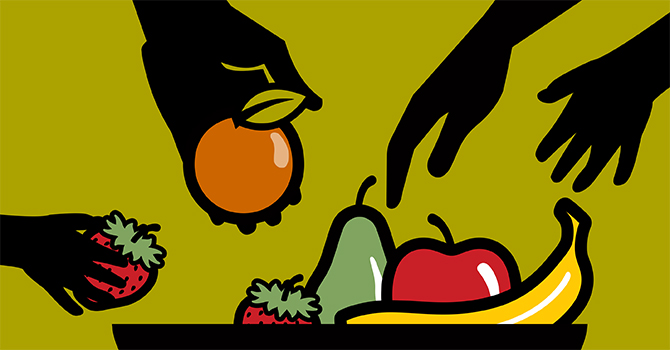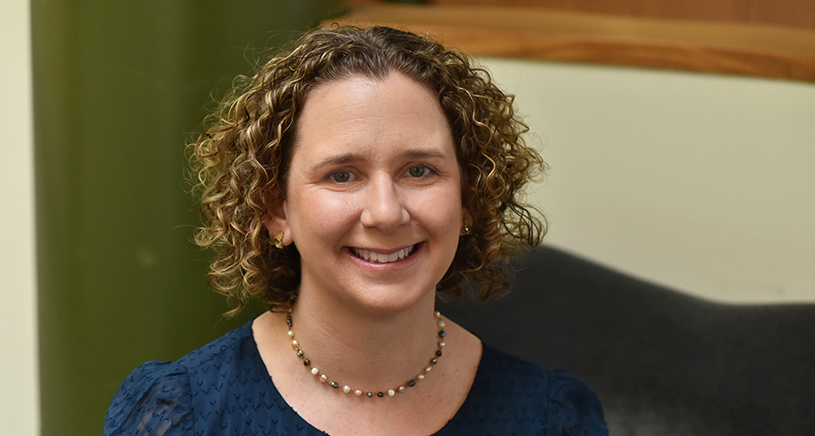Food and Family: How to Raise Kids Who Have a Healthy Relationship With Food

From a population health perspective, understanding kids' eating behavior is more important than ever. Today, nearly one in five school-age children in the US is affected by obesity, and childhood obesity disproportionately affects children living in low-income households. But it's not just about preventing obesity, it's about helping kids establish lifelong healthy relationships with food and with their bodies.
In this episode of Population Healthy, nutrition and health behavior experts from the University of Michigan School of Public Health explore the ways we can help children and teens establish good habits and build the foundation for healthier lives. Listen to "Population Healthy" on Spreaker.
Listen to "Population Healthy" on Spreaker.
|
Subscribe and listen to Population Healthy on Apple Podcasts, Spotify, Google Podcasts, iHeartRadio, YouTube or wherever you listen to podcasts! Be sure to follow us at @umichsph on Twitter, Instagram, and Facebook, so you can share your perspectives on the issues we discussed, learn more from Michigan Public Health experts, and share episodes of the podcast with your friends on social media. |
[music]
00:03 Alison Miller: We want to be able to identify ways to intervene and prevent obesity from kind of taking hold in young kids because it's really, really hard to intervene, to reverse that process later in development.
00:17 Kendrin Sonneville: Parents have a hard job, right? They want to raise healthy children and also raise children that have a healthy relationship with their bodies and with the foods that they eat, and it can be a daunting task.
00:28 Kate Bauer: Really a great goal is to sit and eat together and enjoy food and enjoy each other's company, and let's not make life more difficult than it needs to be.
00:41 Narrator: Public Health as a field is often misunderstood by the, well, public. We're here to change that with the help of some leading experts. Hello and welcome to Population Healthy, a podcast from the University of Michigan School of Public Health. Join us as we dig into important public health topics, stuff that affects the health of all of us, at a population level, from the microscopic to the macroeconomic, the social to the environmental, from neighborhoods to cities, states to countries and around the world.
[music]
01:25 Moderator: Let's talk about kids and food. From a population health perspective, understanding kids' eating behavior is more important than ever. Today, nearly one in five school-age children in the US is affected by obesity and childhood obesity disproportionately affects children living in low-income households, but it's not just about preventing obesity, it's about helping kids establish lifelong healthy relationships with food and with their bodies. So let's dig in and let's start with parenting.
01:58 KB: I am Kate Bauer, I'm an Assistant Professor in the Department of Nutritional Sciences at the University of Michigan School of Public Health. Family meals and healthy eating does not need to be complicated, no one is advocating that parents are making fully from scratch four-course dinners. With my kids, some nights we just have turkey sandwiches and apple slices, super easy, 5-10 minutes. There are a lot of factors in our day-to-day life that get in the way of effective nutrition for our kids, right? We can think about setting up the home environment for success and really for any child, but particularly a child who may gravitate more towards some of the less healthy food.
02:36 KB: So some of the things in setting our environment up for success are having healthier foods more accessible and available to our kids, things like having a great fruit bowl on the counter. Some parents have like a healthy snack drawer in their fridge, and it's somewhere that the kids can themselves go, grab a cheese stick, grab baby carrots, something like that. It's important to allow kids to have some independence in their food choices, but constrain it. Only have the foods you want your child to eat available for them to eat, and then that will limit what's available to kids and you won't be having these conflicts as often where they say, "I want candy." And you're like, "No, not now!" Right? If it's not even in your house, then it's not an argument anymore.
03:19 KB: We also know there are a lot of parent-level factors that make feeding our families more difficult, things like being tired. What parent isn't tired? Things like difficult work schedules. So we've done some research in the past on different work routines and schedules and looking at parents who don't work or work part-time or full-time, and we know that those parents who work full-time are less likely to have family meals, are more reliant on fast food because they're running all the time.
03:47 KB: You know one great suggestion for keeping family meal routines is having the same type of meal every Monday, every Tuesday, so taco Tuesdays is a great option. You don't even need to think about it, you don't need to reinvent the wheel every week, you know what you're gonna make, you make it simple. There have been a lot of questions in the research world about restriction and restrictive feeding. There has been sort of a traditional belief grounded in research that's been going on for 20, 30 years that says that we shouldn't restrict our children because there is early evidence that girls whose mothers reported restricting their eating, gained more weight over time. And that has led to a lot of feeding philosophies that kids should be able to have control over when they eat, what they eat, how much they eat. And I think for most kids, that is a really good strategy. Again, provide healthy options to your child with balance.
04:45 KB: If you are working two, three jobs, uncommon schedules, you're driving your kids around, drive past McDonald's and your kids are screaming, of course, you're gonna bring your children to McDonald's. It's a dollar menu, it makes your kids happy like hat is the most obvious, rational parenting decision someone can make at that moment. So I am completely empathetic to that. Even in the context of fast food, you can make healthier decisions. We do occasionally go to McDonald's when we're traveling or busy. We get the white milk, they can get a hamburger and the apple slices, that is a totally fine, well-balanced meal and it keeps the peace within the family. It takes a little forethinking and a little control on the front end of things, but I don't think you need to have home-cooked meals every night to have some sort of perfect diet. We can make small changes in different contexts and give our kids a variety of diet.
[music]
06:12 Narrator: Now let's look a little closer at self-regulation, what is it, and how does it help shape our eating behaviors and our relationship with food?
06:21 AM: My name is Alison Miller, I'm a developmental psychologist, and I'm at the University of Michigan School of Public Health. I study early childhood development and health, specifically obesity, eating behavior, stress and self-regulation in young kids under age 5 years old.
06:38 AM: It's important to consider obesity and risk for developing obesity early in childhood because there's a strong likelihood that if a child is obese or overweight early in development and in fact, across the first two years of life, the rate of weight gain has been shown to predict later obesity, which is associated with health problems later in development.
07:01 AM: One of the ideas of looking at the early childhood period is that we want to be able to identify ways to intervene and prevent obesity from kind of taking hold in young kids because it's really, really hard to intervene to reverse that process later in development.
07:19 AM: The other thing is that in early childhood, we really start to develop health habits that can stick with us for a long time, so things like the way we eat, the types of food preferences we develop, our sleep habits even, and certainly our propensities for self-regulation and regulating our emotions. All of those things have roots in early childhood, and it's important to kind of establish positive habits in those areas as early as we can.
07:47 AM: Really self-regulation is the process of kind of coordinating our behavior and our emotional response and our attention to achieve a goal. In toddlerhood, self-regulation capacity is really just starting to develop. Anybody who's had or interacted with really young children know that they're not always goal-focused, but they're beginning to develop capacity to pay attention to things and to regulate their emotions and to control their behaviors, and that's what we mean by self-regulation in toddlers.
08:19 AM: One thing that I've studied is how children's ability to self-regulate in the context of attempting food is associated with their later risk for obesity over time. Early interactions usually between a caregiver, like a mother or a father and the child kind of helped the child develop the ability to self-regulate. One thing that I think could be helpful for parents to think about is what type of child you have in terms of their self-regulation particularly around eating. If you're the parent of a child who would really like to eat all the time, you may have to adapt your parenting a little bit to limit that child's opportunities for eating.
09:00 AM: It's important to develop a loving relationship with your child and be able to show your child that even if they're upset, there are ways that they can calm down and there are different strategies that they can use to calm down, even if they're frustrated by waiting for something. We know that sleep and self-regulation are very intertwined. We did a study where we fed children a lunch and then we presented the children with an array of different snacks or dessert foods to see whether they would eat in the absence of hunger, so after they had just had lunch. We looked at the parents' report of the child's sleep in relation to how much the children ate in the absence of hunger. And what we found is that kids who were reported as having poor sleep quality, so waking up in the middle of the night, going to bed really late, having inconsistent sleep, those kids were much more likely to eat in the absence of hunger than kids who had better sleep quality.
09:52 AM: I think what we can take away from this study is that it's important to consider things like sleep that may be modifiable that can affect self-regulation. Unfortunately, the rate of child poverty in this country is quite high, so about one in four kids are growing up in poverty in early childhood. Why that's important for understanding childhood obesity is that growing up in poverty carries with it all kinds of risks that promote obesity, both in childhood and later in life. We know that having regular routines is really protective against developing obesity as a child and living in conditions of poverty and high stress and instability can really interfere with that.
10:34 AM: On a broader level, we also know that living in a high poverty environment makes it more difficult to access healthy food, to engage in regular and safe exercise, to have opportunities for after-school activities that are healthy and safe. For kids who are living in poverty, in particular, and experiencing high levels of stress, we know that it's important to address their material needs and make sure that they have the healthy foods and access to safe exercise activities that we know are important. But I would argue that's often not enough because they're experiencing stress that can affect health behaviors that we know are important for protecting against obesity, like their sleep or their emotional coping.
11:26 AM: In terms of intervention programs that have focus on self-regulation, they're not been very effective and I would argue that sometimes the environment in which the child and family are existing in is so stressful that sometimes it's hard to swoop in and focus on something as specific as self-regulation, because the other material needs are not met. I think one of the things that's important to understand and appreciate, especially when we're talking about childhood obesity, is that there can be a lot of stigma for parents when their child is overweight or obese, and they can be perceived as kind of the problem. If you talk to parents whose children are struggling with weight they're very aware and they very much care, and it's not that they don't care or are feeding their child bad food. That's important to remind ourselves that parents are experiencing stress, and talking to the parents about what feels feasible for them in terms of intervention is really important.
12:26 AM: One thing that we talk about with parents is, how to develop strategies that can still give your child a reward, but maybe not always a food-based reward. This is hard because I think that the other thing to acknowledge is that food-based rewards are nice for parents, they're nice for children, they're often inexpensive. Giving a cookie is a lot cheaper than buying a new video game, and so especially for parents who are on under-resourced situations. It's important to recognize this and to recognize that this may be a really important parenting tool, and it can be hard as a parent to think about meeting your child's immediate needs as well as trying to promote their long-term health.
[music]
13:14 Narrator: Many factors can influence a child's relationship with food. What happens when that relationship becomes unhealthy in some ways? About 15% to 20% of young people in the US struggle with disordered eating, which can range from extreme dieting to binge eating.
13:30 KS: Hi, my name is Kendrin Sonneville, I'm an assistant professor at Michigan Public Health.
13:34 KS: Parents have a hard job, right? They want to raise healthy children and also raise children that have a healthy relationship with their bodies and with the foods that they eat. One thing I tell parents is that eating is not just about nutrition. One of the reasons we eat it is to fuel our bodies and to give ourself nutrients, but eating is also about enjoyment and about culture and about spending time as a family. And I encourage parents to make sure that none of those areas becomes more important than the other. When nutrition becomes the primary reason that we eat and the primary reason we put particular foods on the table, that's when we can get ourselves into trouble.
14:10 KS: Eating disorders have a higher mortality rate than many childhood cancers. That's a really sort of startling statistic, but it reminds us that they have to be taken seriously, and we shouldn't wait and see, and help people grow out of it. So many cases of eating disorders emerge during mid to late adolescence, so typically corresponding with the high school years or the early college years. We do see new cases occurring in very young children, we'll see even as young as 9 or 10 and we can also see new cases of eating disorders emerge into even late adulthood, but the vast majority of people who develop eating disorders will first experience symptoms during middle school, high school, or college.
14:51 KS: There are three primary eating disorders that we think of: Anorexia nervosa, bulimia nervosa, and binge eating disorder. Anorexia nervosa is characterized by extreme dietary restriction and usually some amount of body image disturbance. Many people who engage in these extreme dietary restrictive behaviors and this extreme dieting don't actually always classify as being underweight, and so may not get this diagnosis. So technically, an anorexia nervosa diagnosis requires dietary restriction, low body weight, and body image disturbance.
15:26 KS: Bulimia nervosa is characterized by a combination of two behaviors: One is binge eating, which is eating, in a short period of time, a large amount of food more than other people would eat under similar circumstances and experiencing a loss of control during that eating episode, but you couldn't stop even if you wanted to. So, in bulimia nervosa, that binge is then followed by some type of compensatory behavior. We classically think of bulimia nervosa as involving self-induced vomiting but it could also be taking diet pills or laxatives to control weight. It could be extreme exercise following that binge eating episode, it can also be fasting, so not eating to compensate for that eating episode.
16:05 KS: And then the third eating disorder, binge eating disorder, which is the most common of the three involves just that binge eating episode, the eating of the large amount of food and the feeling of loss of control during the eating episode. We have really sort of stereotypical ideas or notions about who develops an eating disorder. In the field, we refer to this mess or the stereotypes about who gets an eating disorder as swag, skinny, white affluent girls that has really historically been the poster child of who gets an eating disorder. And in fact, skinny, white, affluent girls get eating disorders, but so do men, so do people of color, so do people of higher body weights.
16:43 KS: One of the more consistent demographic patterns we see in eating disorders is that they are more common in females relative to males. But that ratio is probably about two-and-a-half to one or three to one, so it's not as different as most people would expect. From a public health standpoint, I think it's important to understand that eating disorders affect all people, that we're working to prevent them in all communities and that we're communicating with clinicians that they should be screening, looking for eating disorders in all their patients, irrespective of whether or not they think they may or may not be at risk.
17:16 KS: In this country, there is a prevailing message of idealization of thinness, and lean, and muscular body types, and this message is conveyed through the popular media for sure, but also through public health messaging, which really idealizes thin bodies as healthy bodies. And there are inadvertent consequences of sending messages that idealize thin bodies, because these messages can be internalized leading to dieting, disordered weight control behaviors, and ultimately the onset of eating disorders.
17:48 KS: I encourage parents to act quickly if they suspect that their child has an eating disorder. As I mentioned, there are many effective treatments for eating disorders, and the best hope that we have for successful treatment is early intervention. These certainly are cases of people who have significant symptoms who improve over time on their own, but there are subset of people who struggle for their entire life with their eating disorders and getting help early is the best chance we have at full recovery and remission from these eating disorders.
18:21 KS: I think when parents are worried that their child has an eating disorder, it makes sense that they panic and they try to do extreme things like force-feeding their child or sort of withholding things until a child eats or until a child gains weight if this is a child that has an eating disorder that's characterized by restriction or low weight. What I would say to those parents is, there are potential risks of doing this on your own without the help of a professional. The other thing I tell parents if they do have a child that's struggling is to avoid making comments about food and weight throughout the recovery process. A parent might be tempted to say, "Oh, I'm so proud of you for finishing that food," or, "You look great, you look healthy." A child may interpret that as, "Oh, I have gained too much weight," which is necessary and appropriate as part of the treatment, but may make it harder for that child to stay on their treatment course if they feel like they are having this weight gain that is really against what their eating disorder is telling them they should be doing.
19:17 KS: Eating disorders can be preventable, and in fact, we're seeing this in the field of public health for other mental illnesses. We are talking about suicide prevention, we are talking about substance abuse, we are talking about depression and anxiety. If you think about the kinds of things we study at schools of public health, we tend to know quite a lot about environmental factors that increase risk. In the field of obesity, for example, we know a lot about neighborhood characteristics that alter someone's risk of obesity, and feeding practices, and early life stressors, and other exposures. But if you think, what do we know about what in the environment causes eating disorders, we actually know quite little. It is a completely new field where we're thinking about what's happening on a population level that can change someone's course of eating disorders.
[music]
20:12 Narrator: Thank you for listening to this episode of Population Healthy from the University of Michigan School of Public Health. We're glad you decided to join us, and hope you learned something that will help you improve your own health or make the world a healthier place. If you enjoyed the show, please subscribe or follow this podcast on iTunes, Apple Podcast, Google Play, Stitcher, Spotify or wherever you listen to podcasts. Be sure to follow us at umichsph on Twitter, Instagram, and Facebook so you can share your perspectives on the issues we discussed, learn more from Michigan Public Health experts and share episodes of the podcast with your friends on social media. You can also check out the show notes on our website, sph.umich.edu/podcast, for more resources about the topics discussed in today's episode. We hope you join us for next week's episode where we'll dig further into public health topics that affect all of us at a population level.
Related Links
- Building a Culture of Wellness in Michigan Schools
- Learning to Cook, Learning to Belong
- Breaking Down Barriers to Food Access
- From Metabolomics to Epigenetics, Nutrition Is about More Than Food
In This Episode
 Katherine Bauer
Katherine Bauer
Assistant Professor of Nutritional Sciences, University of Michigan School of Public Health
Kate Bauer is an epidemiologist whose research focuses on identifying social and behavioral determinants of obesity among children and adolescents, and the translation of this research into feasible and effective community-based interventions. Much of her work focuses on the role of families in children's and adolescents' obesity risk. Learn more.
 Alison Miller
Alison Miller
Associate Professor of Health Behavior & Health Education, University of Michigan School of Public Health
Alison Miller is a developmental psychologist who studies risk and resilience in children and families. She studies basic developmental processes, including self-regulation of emotions, sleep, eating behavior, and neuroendocrine stress responses in young children. Learn more.
 Kendrin Sonneville
Kendrin Sonneville
Assistant Professor of Nutritional Sciences, University of Michigan School of Public Health
Kendrin Sonneville is a registered dietitian, behavioral scientist, and public health researcher whose research focuses on the prevention of eating disorders among children, adolescents, and young adults. Learn more.
